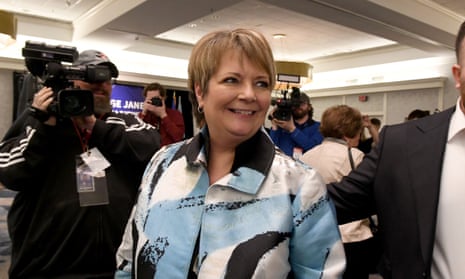In a historic election, the liberal judge Janet Protasiewicz won her race for a seat on Wisconsin’s supreme court on Tuesday. Her win will flip the ideological balance of the state’s highest court, which has been controlled by a conservative majority for 15 years.
Elections and democracy observers have called this election the most consequential one of the year, with abortion rights, redistricting and election rules at stake. The race pitted Protasiewicz, a Milwaukee circuit court judge and former prosecutor, against Dan Kelly, a former Wisconsin supreme court justice with ties to election deniers and the far right.
Protasiewicz will replace the conservative justice Patience Roggensack on 1 August; the court will be controlled by a narrow liberal majority.
The race smashed campaign finance records for state judicial elections, drawing more than $45m, according to a WisPolitics analysis. By comparison, in Wisconsin’s last supreme court race in 2020, donors brought in about $10m. Political groups and wealthy individuals across the country have opened their coffers on both sides of the race, with Protasiewicz raising nearly $9m from the Democratic party and outside groups pledging more than $6m on pro-Kelly advertisements.
The massive contributions underscore the stakes of the race – from abortion rights to the state’s electoral maps, which experts have identified as one of the most gerrymandered in the country.
In 2020 the Wisconsin supreme court narrowly rejected an attempt by former president Donald Trump to overturn the results of the presidential election; the court could see a similar challenge in 2024. Following the 2020 elections, Kelly was hired by the Wisconsin GOP to advise on a plan to have a group of Republicans falsely claim to be electors. The plan failed and Wisconsin’s 10 Democratic electors voted for Joe Biden, reflecting the popular vote in the state.
In a March interview with the Guardian, Protasiewicz said the future of democracy in Wisconsin and at the national level motivated her to run. “I thought about our democracy, and our democracy being at stake. And that’s why I decided to do it,” she said. “All the issues that we care about are going to come in front of this court. But primarily, primarily, our democracy is on the line.”
When the US supreme court overturned Roe v Wade in June, an 1849 law banning abortion went back into effect in Wisconsin. Abortion quickly emerged as a top issue in this race, with voters across the state mobilizing around the question of abortion access. A challenge to the ban is currently making its way through state courts and will probably end up in front of the state supreme court this year.
During the race, Protasiewicz was open about her personal support for legal abortion access, and although Kelly refrained from sharing his views on the campaign trail, his campaign benefited from more than $1m from the anti-abortion group Women Speak Out Pac and earned endorsements from three anti-abortion groups in the state.
With a liberal majority on the court, the 1849 ban could be overruled.
Ahead of the announcement of Protasiewicz’s win Tuesday night, Mandela Barnes, Wisconsin’s former lieutenant governor who ran unsuccessfully for a US Senate seat in 2022, told the Guardian that her victory would be incredibly significant for the state.
“If she pulls this off we can restore balance, we can restore fairness, we can restore actual justice,” he said. “That’s what’s exciting about it.”
At Protasiewicz’s election night watch party in Milwaukee, supporters followed the election on their phones and broke out in excitement as favorable results were reported. The room erupted once the race was called for Protasiewicz.
“She’s one of those people who’s Wisconsin to the bone,” Sonya Bice, 57, a lawyer in Madison, said about Protasiewicz. “She’s one of those people who’s willing to get out there and run in what everyone knew was going to be a very ugly race.”
Progressive groups in the state are preparing to take advantage of the supreme court’s new liberal majority. Nicole Safar, the executive director of Law Forward, a progressive non-profit legal group, said organizers were considering how best to challenge the state’s rigged legislative maps.
“Law Forward and our allies and our co-counsel are seriously looking at what a partisan gerrymander claim under the Wisconsin constitution looks like,” she said.
In a special election that is still too close to call, voters will decide between Republican Dan Knodl and Democrat Jodi Habush Sinykin to represent Milwaukee’s northern suburbs. If Knodl wins, the Republican party will have a supermajority in the state senate, paving the way for the party to impeach state officials – a process that Knodl says he would consider launching to pull Protasiewicz from the supreme court.
